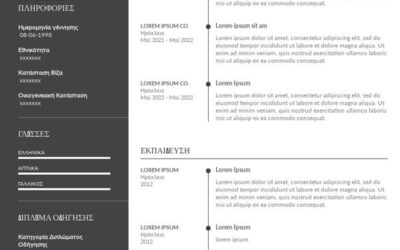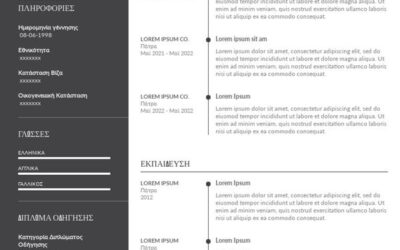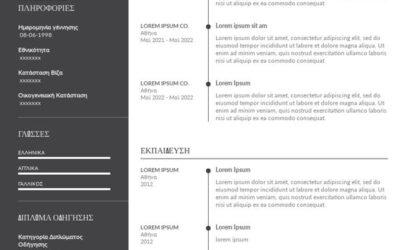In today’s time, when there’s a bulk of rising talent in sports, you need a sports resume to showcase your skills and prove your worth why you deserve a certain opportunity over the rest of the people.
It doesn’t matter if you’re an amateur sportsperson or the captain of your team, a resume will always help you path your way around some life-changing opportunities.
As the competition in sports is getting fiercer day by day, the job opportunities in any sports-related area are also seeing high traction from college athletes.
Thus, for the past few years, jobs also require you to have a cover letter that emphasizes your motivation as to why you want to join a particular company/brand or a club, but we’ll talk about it later on in the article.
Additional Information About A Sports Resume
There are N number of opportunities in the field of sports and the pay varies depending on their hierarchical level.
But to give you an idea of how well-crafted resumes can land well-paid jobs, a sports instructor with nominal qualifications earns an average annual pay of $41,000 (as per Payscale.com)
Now imagine how well you can get paid just by streamlining all your achievements in a well-crafted sports resume with references to back you up.
Sports Resume Examples
Youth Sports Coach
Brooklyn, NY 11245
(123) 4564090
Jperalta@gmall.corn
Professional Summary
Efficient and detail-oriented Youth Sports Coach with expertise in outdoor game rules and regulations. Proven ability to run events and competitions and monitor players. Works efficiently with officiating team members to quickly resolve issues as they arise and protect ethical standards of play. Seeking a Youth Sports Coach position to apply expertise within a progressive sports organization.
Work Experience
Brooklyn University – Senior Baseball Coach
April 2017- current Brooklyn. NV
- Informed players, coaches, and other officials of infractions of the rules and issued appropriate penalties for game infractions called by officials on the field.
- Collaborated with coaches, players, and umpires to discuss game calls by umpires and settle disputes.
- From 2017 to 2020, served as umpire for more than [Number] games.
- Provided players and coaches with the rules, regulations, and league guidelines of play and led discussions to eliminate misunderstandings and misinterpretations.
- Checked sporting equipment and competitors to ensure compliance with event and safety regulations.
Education
MBA in Applied Sports Fitness
Cornell University | Ney York
Bachelor’s in Fitness Training
University of New York | New York
Skills
- Endurance
- [League] regulations
- Multi-Task Management
- Operational improvement
- Excellent communication
- Bilingual in [Language]
- Gameplay management
- Good sportsmanship abilities
- Nutrition supplement familiarity
How to make a sports resume
A lot of people in sports used to get opportunities directly from the field and they never got into this zone of writing a resume to land a job. Just like others, a sports resume also follows a channelized path from top to bottom which must always be kept in mind.
A sports resume is not only needed to get a job but for young college athletes out there with great talent, a CV is a key to achieving various sports scholarships from big clubs and brands. This can help you not only complete your studies but even land a contract with such brands.
A resume, no matter how simple it looks, follows a format. The format describes the overall flow of information within the resume.
There are 3 types of resume formats to choose from and they are as follows: –
- Reverse Chronological – The reverse chronological resume format lets you write your most recent job experience on the top and you move back in reverse till your first job, by mentioning it at the end.
- Functional – The functional resume format emphasizes more on your skills and educational qualifications rather than your work. Hence, if you’re a university student or a recent graduate, you can mention your education, skills, and achievements in place of the job experience.
- Combination/Hybrid – The most popular and widely used resume format. A combination resume format combines the above two formats to give a candidate the best possible directional flow.
The layout of a Sports Resume
The layout for a sports resume is what we call a “resume template”. A template is the basic yet most important factor of a resume as it is the foundation on which you as an athlete lay down all your qualifications.
This segmentation will help you understand how much area you want to cover in your resume.
Certain points to be kept in mind before selecting your resume template: –
- Always select a template that defines all your required sections and do not compromise content with design.
- Make sure the color scheme is subtle and does not take away importance from your content.
- The font must always be simple and formal, not fancy and stylized.
- Never exceed your resume beyond 1 page.
- Get your cover letter that complements your sports resume template.
The structure of a Sports Resume
The structure defines what all sections will be included in your resume and how much space should they be given to compensate for all the information you want to include.
Everything in your resume, from header to footer, defines its structure.
Default sections that must always be mentioned in your resume: –
- Professional Summary / Objective
- Work Experience
- Education
- Skills
- Certifications & Achievements
- Additional Info (interests, hobbies, etc.)
- References
The above sections are the most standard way of composing a resume as a recruiter needs all this information to form a basic perception about you as a person and as an athlete.
However, you’re free to arrange the sections according to your will as if you’re a university teenager or college with more educational qualifications than work history, you can put the education section first and emphasize your educational achievements more than your work history.
Start with the Header
The header, as the name suggests, is the first and most prominent area of your resume. As a result, you have to make sure whatever content you write here must always be simple, easy to read, and is very precise.
The header usually consists of your name, current/prospective job title (in case of high school/college teenagers looking for scholarships, you can mention the type of scholarship you’re looking for), and your basic contact details.
Your name must be bold and clear, followed by the job title, which should be comparatively smaller in size.
What makes a sports header good or bad?
Certain resume formats require you to add your picture but that is usually asked by the recruiter and is country-specific. Hence, if the job requires you to add your picture, add it on the immediate top left of your header, aligning it properly with your name and job title. If not, try to refrain from adding your picture as it might reduce your chances.
Just below the title, add your basic contact information and if you have some skills to show off, try adding your social media icons and linking them to your profile.
Make sure the header does not look too empty or too cluttered.
About Me: How to write a professional summary
Here the professional summary comes into play. A professional summary is a brief paragraph, not exceeding more than 5 sentences, covering all the high-weighted points of your resume. It also includes what kind of job opportunities you’re looking for and in which specific domain, while emphasizing your skills and certain work experiences or educational qualifications that would make an impression.
A professional summary is needed to help the recruiter fast track their process by simply reading the brief and determining whether reading more about is worth their time or not.
Hence, a carefully written professional summary can entice the recruiter into reading more about you as a candidate and in sports, it’s so much important for you as an athlete to make sure the recruiters must always read about your achievements and qualifications.
To help you design your professional summary correctly, our experts at Resume Example have crafted certain samples for you to learn from:-
Check out these examples of a youth sports coach
The Student Alternate – A Professional Objective
As the above examples signify the importance of mentioning work, a professional objective plays an exact similar role in a resume with just one difference that rather than work, it lets the candidates, athletes, in this case, emphasize their education, skills, and achievements.
An objective is for athletes with very little to no professional experience and helps them catch the attention of the hiring managers by listing and prioritizing their skills and educational qualifications.
Let’s take a look at the below example by Resume Example (our online resume builder) on how to write a good professional objective: –
As you can see, a correct objective defines a certain skill and qualification and the motive of what kind of job you as a candidate are looking for. Blabbering about how good you are in general will not help you land a job, rather it will give a negative impression about your profile.
Athletic Experience on Your Resume
This goes without saying but having some job experience on your resume pushes your profile above the ones with less or no professional experience.
However what people most struggle with is how to mention that experience and what activities they must write about, as they were responsible for conducting a lot of work, thus, milking the most important aspect of that job boggles the minds constantly.
Describing Your Athletic Experience on Your Resume
Mentioning your work experience is easy but that’s not what the hiring managers are looking for they read your profile.
They not only want to know where you worked and in what position but the most important thing that plays a major role is what activities you undertook there on a routine basis.
The work experience must also be described very briefly yet it should be clear enough for the hiring managers to conclude the roles you did.
Check out the following examples of how you can describe your job roles while mentioning your work experience on your resume: –
- Committed approximately 30 hours per week to training, meetings, film study, travel, and competitions while maintaining a full course load.
- Developed concentration, strong work ethic, and perseverance to meet personal and team goals
- Selected as a representative on the Student-Athlete Advisory Committee
- Three-time Varsity Letter Recipient
- Defensive Player of the [Year]– [Year]
- Selected to the Northwest Conference Scholar-Athlete First Team
- Provided leadership as the team captain for the [Year]– [Year] season
- Informed players, coaches, and other officials of infractions of the rules and issued appropriate penalties for game infractions called by officials on the field.
- Collaborated with coaches, players, and umpires to discuss game calls by umpires and settle disputes.
- Checked sporting equipment and competitors to ensure compliance with event and safety regulations.
- Responsible for keeping score at games, verifying calculations, and providing results to team members and fans.
- Made important and time-sensitive decisions including awarding points gained during the game and imposing penalties as necessary according to the rules and regulations of the gameplay.
- Effectively reacted to complex game situations.
- Gave pep-talk to athletes and fellow coaches to reinforce the need to show good sportsmanship during competitions with opponents both on and off the field.
- Promoted positive communication.
- Supervised strict practice sessions to increase individual skills and proficiency in team activity participation.
- Monitored all common areas for neatness, organization, and upkeep and performed checks on equipment with a focus on safety.
- Promoted positive life choices.
- Assisted in events
Highlight your education and sports formation
No matter how much work experience you have, education is always the soul of any career.
A lot of people do not realize how important the theoretical aspect of sports is in the direction of making it a full-time career.
Not only does it help you move ahead in your profession but also as a student you can apply for various scholarships that can help you land deals at colleges, paving a brighter path for you to get contracts from the big leagues.
The educational section of a resume also faces the same issue as the work experience and that’s how to precisely justify your educational qualification on your resume.
But it’s relatively easier for the candidate to brief the recruiters about his/her education as you’re supposed to mention certain activities and projects which must be direct and to the point.
For example, write your latest 2-3 educational qualifications and write in points what was the most valuable thing you learned or the most important project you had to undertake to complete your study.
Skills: Indispensable for your sports resume
Education and basic experience will only get you to a certain point but it’s your skills that are going to push you towards the big leagues.
The 3rd most important part of your resume is your skills.
Either you’re applying for a job or looking for a scholarship being in your teen years or early twenties, it’s your skills that are going to stand you out from the crowd.
There are certain skills that every hiring manager wants in a prospect and they are as follows: –
For Youth Coaches: –
- [League] regulations
- Multi-Task Management
- Excellent communication
- Gameplay management
- Nutrition supplement familiarity
- Sports medicine knowledge
- Contract negotiation/review/drafting
- Player evaluations
For Young Athletes: –
- Goal-Oriented
- Self-motivated
- Works well under pressure
- Disciplined
- Good sportsmanship abilities
- Endurance
- Time Management
Additional headings for your resume
As you’ve read the standard global format above, there are certain sections in a resume that act as additional sections.
These sections are not necessary, but you can add them if you feel they add good value to your profile.
The additional sections that are usually included in a resume are Hobbies/Interests, Certifications, and Achievements, Languages, References, etc.
If you’re writing a sports resume, it can be assumed that you have some certifications and achievements like awards, etc, from your early years in sports that motivated you to pursue your career in sports. Hence, you can easily add this section to your resume.
As a sports person, if you have certain hobbies or interests that directly impact your skills in sports, don’t refrain from mentioning them as they are seen as indirect facets that not only complement but boost your performance.
For teenage athletes, it makes more sense if you include your early achievements, if you have any, multiple languages if you speak or are learning and some references, again, if you have any as they help you boost your profile to land scholarships.
Summary: Key Points for Writing a resume for sports (even without experience)
- Choose your resume template carefully as it will define the entire flow of your contents.
- Check out our resume builder resume example to learn from real resume samples.
- Maintain precision while explaining your work experience and your educational qualifications.
- Make sure you’ve carefully read the job you’re applying for.
- Always support your resume with a custom cover letter.
- As a sports person, emphasize your skills and achievements more.
- If you’re a youngster trying to carve your way into the sports field, try to learn about different scholarships available and apply for the one that suits you the most.
Frequently Asked Questions for a Sports Resume
These questions are very common during interviews and are meant to complement the information of your resume.
Is there a coach or athlete that you look up to as a role model and why?
Mention the name of a coach or a sports personality that you look up to the most and mention what quality about them attracts you the most. Be careful with your answer as the qualities that you might write will reflect your perception of the sport and hence define the way you think about the sport and the sportsperson.
Which strengths do you believe you have that make you a great athlete?
It’s okay to flex a little about your skills, especially when you have some sort of track record to back it up. Mention your greatest skills that you’ve shown on the ground, not only regarding the sport you played but also with the teams, the coaches, and the authorities.
What do you believe to be one of your weaknesses and what are you doing to improve it?
Mention a weakness that you’re genuinely trying to improve but it must always be related to your profile. For example, you can say that you’re usually a very aggressive player but you’re trying to play defensive as well according to the position on the field. This shows you’re adaptable to the situation but also you’re keeping your playing style intact.
What clubs, teams, or other extracurricular activities were you involved in during high school?
Mention the names of all the sporting events, teams, groups, etc you played under. You can also briefly explain that particular club or team and your contribution to it. The purpose of this question is to understand how much you participated in group activities of your sport and were you able to make a good name for yourself or not.
 |
 |
 |
 |
 |




